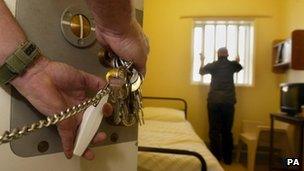Resettlement prisons introduced in bid to cut reoffending
- Published
- comments
Justice Minister Damian Green says a scheme in Peterborough has reduced reoffending by 5%
Offenders in England and Wales will be moved to prisons near where they live before they are released, under plans announced by the Ministry of Justice.
So-called resettlement jails, aimed at cutting re-offending, will house most male prisoners from autumn 2014.
There are plans for 70 such prisons, external, with a trial of the new system planned in north-west England later this year.
The justice secretary said the current system was "hopeless"; Labour queried how the changes would be funded.
Under the plans, existing facilities in England and Wales will become resettlement prisons.
Justice Secretary Chris Grayling said it would mean those in jail could start "working towards their rehabilitation" from the moment they were imprisoned.
Prisoners serving 12 months or under will serve all of their time in a resettlement prison and receive a "tailored package of supervision and support" on their release.

Ministers want every offender to be supervised on release
The majority of inmates serving longer sentences would be moved to a resettlement prison at least three months before the end of their time in custody, the government said.
"Rehabilitation in the community must begin behind the prison walls and follow offenders out through the gates if we are to stand a chance of freeing them from a life of crime," Mr Grayling said.
"Currently a local area could expect to receive offenders from dozens of prisons across the country - this is hopeless.
'Right direction'
"It is little wonder we have such high reoffending rates when you have a prisoner leaving HMP Liverpool, given a travel permit to get them home to the south coast, and then expected to simply get on with it."
Women prisoners are not covered by the plans and are subject to a separate review, which will report later this year.
The government recently announced plans to make every prisoner in England and Wales complete a year-long period of supervision with private, charity and voluntary sector organisations bidding to carry out the work under a system of payment-by-results.
Paul McDowell, chief executive of crime reduction charity Nacro and a former governor of Brixton Prison, said: "We are still sending too many people to prison when they could be better dealt with in the community - especially many of those serving short prison sentences.
"But putting communities at the heart of the criminal justice system through the development of resettlement prisons is a step in the right direction."
Juliet Lyon, director of the Prison Reform Trust said: "Resettlement and rehabilitation do matter but, until and unless you reserve prison for serious and violent offenders, you cannot hope to cut sky-high reoffending rates or maintain safe and decent regimes.
"Given the pace and scale of change, ministers focused on developing the justice market could easily lose sight of the solutions that lie outside of prison bars in health, housing and employment."
Labour said it welcomed the idea of resettlement prisons in principle, but said the plans were "another example of reality being very different from rhetoric".
Shadow justice secretary Sadiq Khan said: "These plans amount to a substantial reorganisation of our prisons system, and it's not clear how it will be funded. Nor is it clear what will happen in London where there is an estimated shortfall of 8,000 places.
"Prisoners from London are currently scattered all over the country, many miles from their family and friends, making this policy announcement meaningless for them."
- Published13 June 2013
- Published22 May 2013
- Published9 May 2013
- Published8 May 2013